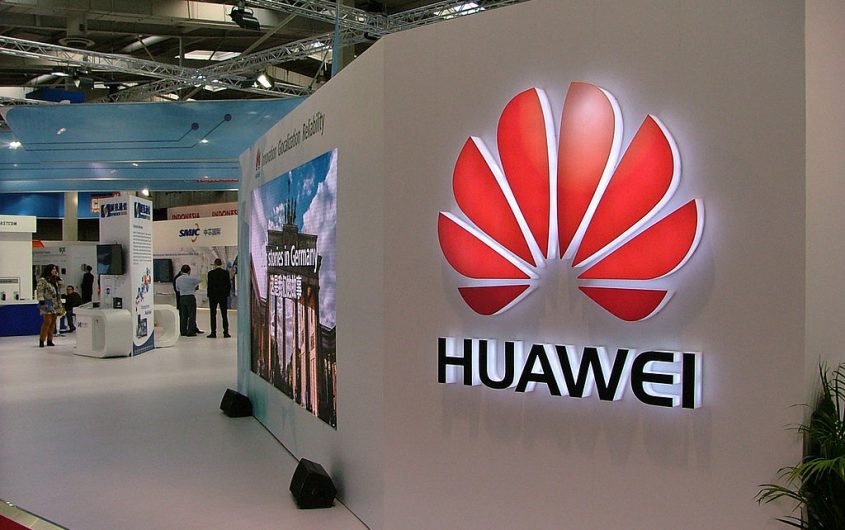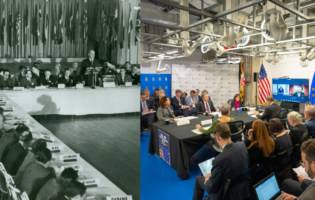
Olaf Kosinsky/Skillshare.eu via Wikimedia Commons
A Transatlantic Approach to Global Technology Standards Competition with China?

Yixiang Xu
China Fellow; Program Officer, Geoeconomics
Yixiang Xu is the China Fellow and Program Officer, Geoeconomics at AGI, leading the Institute’s work on U.S. and German relations with China. He has written extensively on Sino-EU and Sino-German relations, transatlantic cooperation on China policy, Sino-U.S. great power competition, China's Belt-and-Road Initiative and its implications for Germany and the U.S., Chinese engagement in Central and Eastern Europe, foreign investment screening, EU and U.S. strategies for global infrastructure investment, 5G supply chain and infrastructure security, and the future of Artificial Intelligence. His written contributions have been published by institutes including The Chinese Academy of Social Sciences, The United States Institute of Peace, and The Asia Society's Center for U.S.-China Relations. He has spoken on China's role in transatlantic relations at various seminars and international conferences in China, Germany, and the U.S.
Mr. Xu received his MA in International Political Economy from The Josef Korbel School of International Studies at The University of Denver and his BA in Linguistics and Classics from The University of Pittsburgh. He is an alumnus of the Bucerius Summer School on Global Governance, the Global Bridges European-American Young Leaders Conference, and the Brussels Forum's Young Professionals Summit. Mr. Xu also studied in China, Germany, Israel, Italy, and the UK and speaks Mandarin Chinese, German, and Russian.
__
Technology Standards as a New Frontier
Concerns over China’s growing capabilities in new and emerging technologies are intensifying global competition with traditional technology heavyweights like the United States. American policymakers increasingly see the Chinese government’s technology and industrial policy as weaponizing interdependence to the detriment of vital U.S. economic and national security interests. Washington’s crackdown on Chinese telecommunications giants, most notably Huawei, that provide 5G equipment was followed by more stringent scrutiny over Chinese-made tech equipment and system components in products like drones and culminated in last year’s unprecedented expansion of semiconductor export control to China. Across the Atlantic, a growing number of German politicians, government officials, and their European colleagues are sounding alarms over Chinese equipment and systems in critical infrastructure. Berlin adopted the IT Security Law 2.0, which restricts the role of “untrustworthy” suppliers of 5G technology and explicitly aims to match the “security policy goals” of Germany, the EU, and NATO. Against this background, technology standards setting has emerged as a new frontier in this global contest.
Leadership in standardization is key to maintaining international competitiveness in innovation and trade. Holders of standard-essential patents can generate considerable royalties and capture international markets through the removal of technical barriers to trade. The World Trade Organization’s (WTO) Technical Barriers to Trade (TBT) Agreement stipulates that international standards should be used as a basis for technical regulations whenever possible and acts to ensure national policies do not discriminate or arbitrarily restrict international trade. In addition to commercial advantages, technical standards can become de facto extraterritorial when referenced in the regulations of major markets such as the United States, the EU, and China. Such national regulations on issues including algorithm bias and data privacy can inscribe ethical values into technical standards and shape the security and political functions of technologies. Standards adoptions by other countries in their supply chains and critical infrastructure also generate both a powerful source of political influence as well as potential security vulnerabilities.
Ambitions and Reality of China’s Technology Standards Agenda
U.S. policymakers in particular are worried that rising Chinese participation and leadership in international standards development organizations (SDOs) may subvert the transparent, consensus-based process of standards setting in critical SDOs. However, both the extent of leadership capture of international SDOs by Chinese nationals and the effectiveness of Chinese participants’ push for home-developed standards are seriously questioned by industry experts, many of whom caution against politicizing standards development, which could lead to poorly tailored policies and imperil the function of international SDOs.
Undisputed is the fact that Beijing has laid out an ambitious blueprint for the Chinese government and leading tech companies to set global standards for emerging technologies, such as 5G, the Internet of Things (IoT), and artificial intelligence with the publication of strategic documents including Made in China 2035 and the National Standardization Development (NSD) outline document. While these measures demonstrate the Chinese government’s intention to import elements of international SDO processes, with emphasis on private sector leadership and foreign participation, they do not replace China’s state-centered standards system. The party-state continues to exercise significant direct control over domestic technical standardization and actively shape and promote standards to incorporate its ethical and political preferences.
At the same time, intense political attention on technology competition with China brings into focus the need to calibrate policies that strengthen and not jeopardize the global, open, rules-based standardization system that is industry-led and consensus-based.
Central and local governments in China are committed to boosting Chinese companies’ technology innovation and standardization efforts with massive financial support through state-directed investments, subsidies, public procurement, as well as preferential access to data. Successive U.S. technology export control measures only hastened China’s drive to develop domestic alternatives to key technologies.
Furthermore, Beijing seeks to bolster the international adoption of Chinese standards through its growing foreign economic engagements. China’s Standardization Administration describes standardization as a fundamental and strategic objective for the Belt and Road Initiative and identifies a wide range of projects from railway to telecommunications infrastructure that would embed Chinese standards in recipient countries and circumvent international SDOs. The Chinese government also promotes regional standardization forums, such as the China-ASEAN International Standardization Forum to encourage adoption of Chinese standards through bilateral trade and investment. Additionally, new and tightened rules for public procurement, such as the cybersecurity rules for buyers of technology equipment, could be used to exclude foreign competition, reduce supply chain linkages with foreign companies, and induce the development of domestic products with techno-nationalist standards that cater to the needs of an authoritarian, surveillance state. These policies risk a global technology bifurcation with accompanying economic and political consequences.
The Challenging Task of Forging a Transatlantic Approach
The United States and its European partners have forged a consensus that China’s technical standardization push poses serious risks and challenges to their respective economic, security, and strategic interests. A number of standards cooperation initiatives were announced within the framework of the EU-U.S. Trade and Technology Council (TTC). The EU and the United States rolled out the Strategic Standards Information (SSI) mechanism to voluntarily share information about international standardization activities and pledged closer standards cooperation on emerging technologies including AI and Quantum.
However, there’s notable transatlantic divergence over how to manage standards development in a politically and ideologically competitive global environment. The EU’s Standardization Strategy prescribes a more state-led approach that emphasizes and institutionalizes the role of national standardization bodies in the bloc’s standardization governance structure. Brussels’ proposal to avoid any “undue influence” of foreign actors has attracted criticism that the EU’s policy changes exclude experts from the United States and other like-minded partner countries and consign U.S. companies to the same risk category as Chinese ones with regards to European values and interests. And if the accusation of EU’s use of technology standards as a new protectionist tool remains unresolved, it risks both undermining standards cooperation under the TTC and opening a new front of transatlantic trade friction.
At the same time, intense political attention on technology competition with China brings into focus the need to calibrate policies that strengthen and not jeopardize the global, open, rules-based standardization system that is industry-led and consensus-based. Aside from learning from earlier mistakes, such as the U.S. Department of Commerce Bureau of Industry and Security’s entity listing of Huawei that prompted U.S. firms to withdraw from certain standards bodies, the United States and its European partners need to develop a practical approach of engaging Chinese participation in SDOs. That includes targeted risk assessments that focus on the quality and underlying ethical values of standards proposals and more support for U.S. and European companies to participate in SDO processes. Instead of open political tussles at SDOs, U.S. and European governments should expand consultations between government agencies and the private sector and take advantage of other platforms, such as the TTC and the U.S.-EU Cyber Dialogue, to reach agreement on essential ethical and security features to guide technical standards development for their companies. With the introduction of the EU’s new standardization governance structure, enhanced bilateral cooperation between the U.S. and German governments and their industry standards associations, primarily the American National Standards Institute (ANSI) and German Institute for Standardization (DIN) will be more important.
These measures will need to be supported by government efforts to address standards adoption through global trade and investment as well as public procurement. Here, the WTO’s TBT remains highly relevant, and the United States and the EU can both benefit from closer collaboration.








